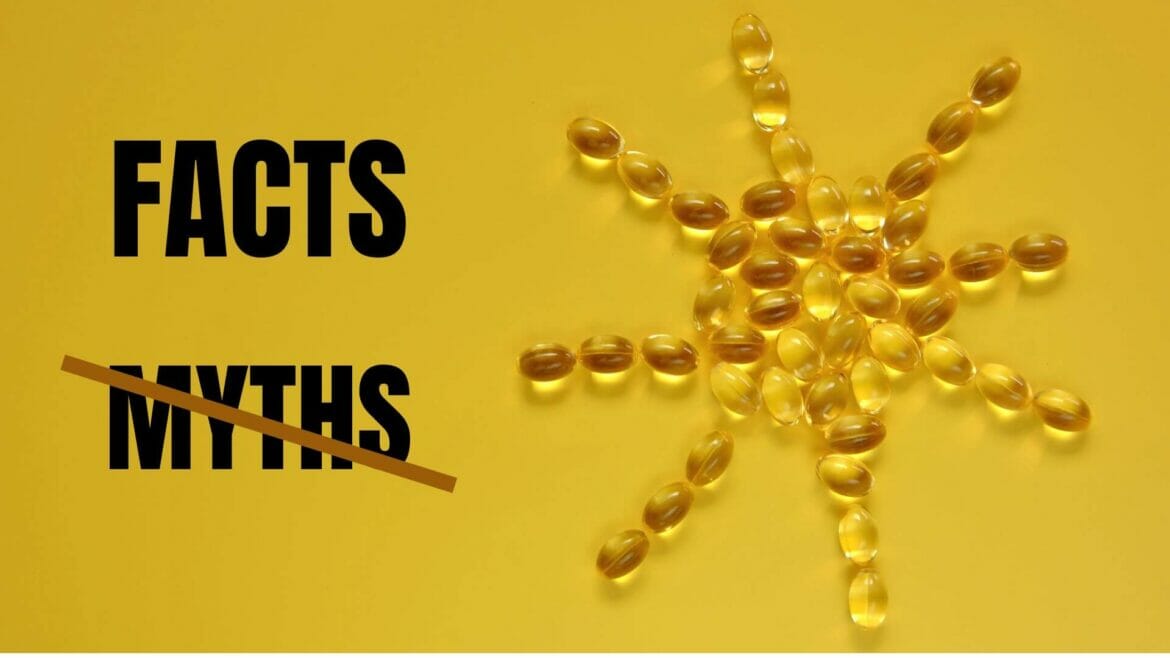In this post: There are quite a few myths and misconceptions about vitamin D, and this post debunks them.
If your knees or cracking without reason, you feel fatigued often, or you feel low unusually frequently, you can check your vitamin D levels. The sunshine vitamin is important for your body for multiple reasons, and your symptoms might be due to a vitamin D deficiency.
If you’d like to know at length about the importance of vitamin D, the normal levels, symptoms of deficiency, sources and supplements, please read here.
While being aware of the facts about vitamin D is very important, it is equally important not to be misled by myths and misconceptions. Here are some common myths about vitamin D, and we have debunked them for you.
Myth 1:
More vitamin D intake, the better.
It is a misconception.
A <20 ng/mL of 25(OH)-vitamin D in the blood is insufficient. 30-100 ng/mL is adequate. But more than 100 ng/ML can create a toxic situation, absorbing more calcium than the body needs.
And it is not clear how long your body can manage high vitamin D levels without causing harm. When the levels get dangerously high, it leads to hypercalcemia that needs medical intervention.
Myth 2:
Everyone must go for periodic vitamin D level checks.
Not at all.
Only certain populations who are at risk of a deficiency must get periodic checks. These may include older people whose ability to absorb and synthesise vitamin D would decline with age, institutionalised patients, certain medical conditions such as osteoporosis or inflammatory bowel disease, living in northern climates, those who underwent weight loss surgery, vegans, dark-skinned people, etc.
Also Read:
- 13 Most Common Menopause Symptoms And Useful Tips To Manage
- 8 Amazing Hormone Balancing Foods To Eat To Correct Hormonal Imbalance
- 5 Useful Ways To Prevent & Manage Post Menopausal Osteoporosis
Myth 3:
The body can make enough vitamin D from sun exposure.
That is a common myth about vitamin D.
The amount of vitamin D synthesised by the body from sun exposure varies depending on skin pigmentation, location, time of day, and use of sun protection. Also, with age, your body gets less efficient in synthesising vitamin D due to a decline in renal function.
Myth 4:
The risk of vitamin D deficiency outweighs the skin cancer risk from sun exposure.
Not true.
The most natural source of vitamin D, of course, is the sun. The UVB rays from the sun turn a chemical (7-dehydrocholesterol) present on your skin into vitamin D3.
However, dermatologists caution about the risk of skin cancer with increased exposure to the sun without protection, say, sunscreen or clothing. Also, there is increasing evidence that no matter how high the SPF of your sunscreen is, a certain amount of UVB rays reach your skin. And the risk of skin cancer weighs down the risk of vitamin D deficiency. So, it is important to use sunscreen, probably with a lower SPF, during the 20-minutes sun exposure for vitamin D.
Myth 5:
Vitamin D does not impact overall health and is essential only for bone health.
This is another common misconception about vitamin D.
Vitamin D is important for bone health, immune function, and cardiovascular health. Further, it plays an essential role in regulating several hormones and is important for sleep and mood regulation.
Myth 6:
When deficient, you can decide the supplement dosage yourself.
Definitely not.
Vitamin D is a fat-soluble vitamin stored in the body’s fat cells before being converted to an active form by the liver and kidneys.
A small person will have less fat and can only store so much vitamin D the fat cells can hold. The excess vitamin D from the supplement goes into the blood, which may cause hypercalcemia.
Therefore, expert recommendation on supplement dosage is important.
Myth 7:
Vitamin D supplements are only recommended for older adults.
Not at all.
Vitamin D supplements are recommended for people of all ages who cannot get enough vitamin D from their diet or sun exposure. The supplements are recommended for people with certain medical conditions as well.
Myth 8:
Vitamin D is not important for infants and children.
This is yet another misconception about the sunshine vitamin.
Infants and children need adequate levels of vitamin D for proper growth and development, including the development of strong bones and a healthy immune system.
So, the truth is,
Vitamin D is crucial for people of all ages, not only for bone health but also for overall health. While the sun is the best natural source of vitamin D, you must not overlook the risk of skin cancer and expose your skin without sunscreen. Further, it is wise to include foods rich in vitamin D. Lastly, certain groups of people, such as seniors, menopausal women, vegans, dark-skinned people, and people with some medical conditions, are at risk of vitamin D deficiency. And those with deficiency must always take dosage recommendations from an expert.
Images: canva.com
